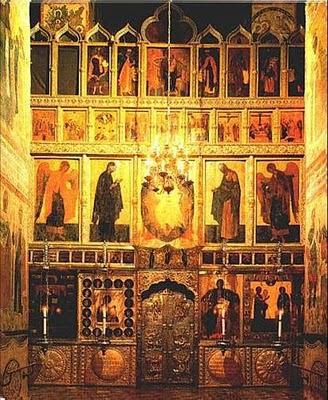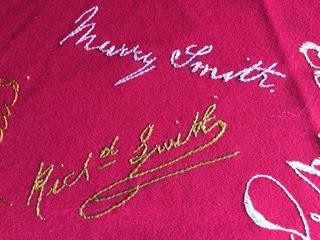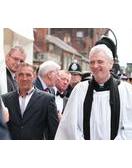Hebrews 12:1-2
If you go into an Orthodox Church, you will see in front of you an iconostasis, literally ‘a resting place for icons.’ It is full of icons of the prophets and forerunners of Jesus, of the apostles, angels and saints.

I remember when we lived in the theological college in St Petersburg, an American Baptist minister was visiting. He came into the church, looked at the iconostasis and quoted Hebrews 12:1, “Seeing we are surrounded by such a great host of witnesses”. And then he added, looking at the icons, ‘and here they are’.
Today is All Saints day.Remember those who have gone before and who are now in glory with Christ1. It is a celebration of those who are our pastHistory matters. We are shaped by our ancestors. In the UK there is a popular TV programme called, ‘Who do you think you are?’. A celebrity is introduced, and they then explore her or his ancestry. We can trace my family back four generations. Sadly, I have no claim to royalty or to fame. The furthest we can get is when my family were carrying coals from the ships to the docks in Swansea. Well that was what they were meant to be doing, but in fact they spent half their time drunk, and the other half in prison. And vicars are aware that history matters. My previous church dated back to the 1300s. And as you came into the building there was a long list of names of vicars, reaching back over the centuries. It made you realize you were part of something much bigger than just me. And that is true. It is true for St Andrew’s. In our relatively short history – since 1884 in this building – we also are dependent on our ancestors, the C19th expat community. Good to have links: the cross and this embroidery of signatures of the 1890 congregation.

But it is also true of the Church as a whole. We are dependent on our forefathers and mothers, on those who have handed the faith to us. Paul writes in 2 Timothy 2.2, ‘And what you have heard from me through many witnesses entrust to faithful people men who will be able to teach others as well’. It is like a batten in a relay race. And I give thanks to those who taught the faith to me: my parents, people like JP or KH.
2. It is a celebration of lifeWe’ve just had Halloween. A couple of days ago I was in a room where they had had a Halloween party. It was full of skeletons, skulls and zombies. I guess that Halloween is an attempt to ridicule death – to take what we fear and turn it into a joke. I guess that is the best that a society without God and without hope for the future can do. But All Saints is a celebration of life. It is a celebration of the fact that those who have died, who put their trust in Jesus, who tried to live for him in the strength of the Holy Spirit, and who died for him, are not dead, but are now with him. It is saying that because Jesus is alive, and they are with him, then they are alive, and they are in glory with him.3. And it is a celebration of holiness What is a saint?A child was asked that in their Sunday school, and they replied, ‘A saint is a dead vicar’!Well, according to the Bible you don’t need to be dead to be a saint, and you don’t need to be a vicar. It is a present reality: In fact, the bible writers call everybody who follows Jesus ‘saints’, not just the special ones. When Paul writes to the churches, he writes ‘to the saints in Corinth, Ephesus, Colossae, Philippi’The word ‘saint’ comes from the Greek ‘agioi’ and it means set apart, and it means holy.
My definition of Holy is of someone who is beautiful on the inside.It is of someone who, according to our reading from Luke 6:20-31, is living for the Kingdom of God and for the Son of Man, and – this is the big test - who loves their enemies.
We are called holy, saints, because we have been set apart; we are with Jesus who is holy, and we have within us the Holy Spirit
But in Romans and 1 Corinthians Paul writes to those ‘called to be saints.’ And we are called to become holy, to become beautiful on the inside. And that is because we need to become what we are. By the power of the Holy Spirit at work in us, we are called to remain faithful to Christ, to persevere, to be obedient to Christ, to be faithful and constant in prayer, to constantly trust him, and yes to discipline our bodies, so that we become what we are. It is hard, but it is worth it. There is a hymn that we will sing in a few minutes: For all the saints. Not just the special ones. Not just the ones they will depict in icons, but all of us. It has the line, ‘We feebly struggle, they in glory shine’.
4. It is a celebration of relationshipWe speak of a communion of saints. Hebrews 12:23 speaks of the assembly of the firstborn (that is Jesus).They worship God as we worship God. They desire what we desire: to see God glorified, to see people become like Jesus, to draw people into this communion of faith, to see people become holy, like Jesus. They are not just our past, but they are part of usYes, there is a great and desperately painful chasm and separation between us and those who have gone before, but there is – across that chasm – an invisible chord. Because they are united to - together with - the risen Jesus, and because we are united - together with - the risen Jesus, then we are still part of them and they are still part of us. That is why it speaks of them as a great cloud of witnesses. They are there, here, cheering us on. Like a crowd in a stadium, only they all know because they have already been there.
For those who know their Harry Potter, JK Rowling has a brilliant and very poignant illustration of this. Harry is going to meet Voldemort. He knows he will die. But as he goes, although nobody but him can see them, he is accompanied by his parents and Lupin and Sirius Black. He is not on his own; the people who have already gone through what he is about to go through, are with him.
And we, in the words of Hebrews 12, are not on our own. We have this great cloud of witnesses, and we look to Jesus.
All Saints: a celebration of those who have gone before, of life, of holiness and of relationship.
That is why, in our service, the prayers often end with the line, ‘Rejoicing in the fellowship of all your saints we commend ourselves and the whole creation to your unfailing love’And it is why, in the communion service, we say: ‘Therefore with angels and archangels, and with all the company of heaven,
we proclaim your great and glorious name, for ever praising you and saying:
Holy, holy, holy Lord, God of power and might.’

